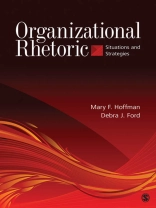An unprecedented text explains how to analyze the role of rhetoric in organizations
Integrating rhetorical theories and methods with principles of organizational communication, this pioneering text provides students with a step-by-step method for analyzing and critiquing examples of organizational rhetoric. The first half of the book offers an accessible introduction to rhetorical research, theory, and criticism and equips students for analyzing the messages of organizations in a variety of contexts. The second half focuses on needs in real-life organizational situations: to create and maintain identity; to manage messages about issues, risk, and crisis; and to communicate with those ‘inside’ the organization.
Contemporary examples and case studies (including a dispute over clean energy in Texas, efforts on the part of restaurant owners in New York to fight food labeling requirements, and a university′s announcement that it is building a ‘body farm’) illustrate the importance of this area of study and provide opportunities for students to apply their emerging analytical and critical thinking skills.
Key Features
- Grounds the explanation and critique of persuasive organizational messages in traditional and contemporary rhetorical literature
- Shows students how to critique the messages organizations use to create and maintain organizational power
- Demonstrates the importance of rhetoric to the success of the organization
- Uses case studies and accompanying worksheets to help students move through the process of analyzing sample situations and messages
- Covers image/impression management, issue management, crisis management, and other key facets of organizational rhetoric
- Includes models of the book′s method for analysis at the beginning of each chapter to help students visualize how each step fits into the larger system
Intended Audience
Organizational Rhetoric: Situations and Strategies is ideal for a wide range of courses at the upper-level undergraduate and master′s level, including Organizational Communication, Organizational Studies, Public Relations, and Rhetorical Studies. This first-of-its-kind textbook is also an essential addition to the libraries of Communication/Rhetoric and Business instructors.
สารบัญ
Preface
Acknowledgments
1. Organizations and Rhetoric in Contemporary Culture
Defining Rhetoric
Defining an Organization
Defining Organizational Rhetoric
Understanding Organizational Rhetoric
Characteristics of Organizational Rhetoric
Reasons for Studying Organizational Rhetoric
Goals for Studying Organizational Rhetoric
Practical Outcomes of Studying Organizational Rhetoric
A Process for Analyzing Organizational Rhetoric
Conclusion
2. Identifying Rhetorical Strategies in Organizational Rhetoric
Canon of Invention
Canon of Organization in Organizational Rhetoric
Canon of Style in Organizational Rhetoric
Canon of Delivery in Organizational Rhetoric
Interdependence of Invention, Organization, Style, and Delivery in Organizational Rhetoric
Canon of Memory in Organizational Rhetoric
Special Situations and Rhetorical Strategies
Conclusion
Worksheet for Identifying Rhetorical Strategies in Organizational Texts
3. Rhetorical Situations in Organizations
The Importance of Context in Rhetoric
Two Perspectives on Rhetorical Situations
The Rhetorical Situation in Organizational Rhetoric
Researching the Rhetorical Situation
Conclusion
Case Study: A Showdown Over Power in Texas
Worksheet for Describing Rhetorical Situations in Organizations
4. Critical Approaches to Organizational Rhetoric
Historical Overview
Key Ideas in Critical Approaches to Organization Studies and Organizational Rhetoric
Summary of the Key Concepts in Critical Theory/Perspectives
Making Choices: Ethics and Organizational Rhetoric
Conclusion
Note
5. Evaluating and Critiquing Organizational Rhetoric
Two Approaches to Analyzing Organizational Rhetoric
Conclusion
Worksheet for Conducting an Evaluative Reading
Worksheet for Conducting a Critical Reading
6. Identity Creation and Maintenance Rhetoric
The Foundation for Identity Rhetoric: Organizational Identity
Identity Building Rhetoric
Identity Maintenance Rhetoric
Evaluating and Critiquing Identity Creation and Maintenance Rhetoric
Conclusion
Case Study: “Who Says the Internet Is Only For Young People?” Identity and Disaster Relief
7. Rhetoric About Issues
Defining Issues and Issue Management in Organizations
Foundation for Understanding Issues Rhetoric: Issue Life Cycles
Issue Management: The Rhetorical Situation
Strategies for Rhetoric About Issues
Evaluating and Critiquing Rhetoric About Issues
Conclusion
Case Study: Menu Labeling—Healthy Idea or Big Brother?
8. Rhetoric About Organizational Risk
Defining Risk in Organizations
Foundations for Understanding Risk Rhetoric
The Rhetorical Situation for Risk Rhetoric
Strategies for Rhetoric About Risk
Evaluating and Critiquing Rhetoric About Risk
Conclusion
Case Study: No Bodies in My Backyard
9. Crisis Rhetoric
Defining Rhetoric About Crisis
Foundation for Understanding Crisis Rhetoric: Life Cycle of a Crisis
Crisis Management: The Rhetorical Situation
Strategies in Crisis Rhetoric
Evaluating and Critiquing Organizational Rhetoric About Crisis
Case Study: The Perfect Storm
10. Organizational Rhetoric for Internal Audiences
The Rhetorical Situation in Internal Organizational Rhetoric
Rhetorical Strategies for Internal Messages
Evaluating and Critiquing Internal Organizational Rhetoric
Conclusion
Case Study: A New Record—Transitioning to Electronic Medical Records
Epilogue: The Ancient Art of Rhetoric in a Complex Organizational World
Rhetoric in a Globalized Organizational World
Corporate Rhetoric in Nonprofit Organizations
Traditional Rhetorical Strategies in Contemporary Forms
The Environment as Situation and Strategy
Appendix: Worksheets for Analyzing Organizational Rhetoric
Worksheet for Identifying Rhetorical Strategies in Organizational Texts
Worksheet for Describing Rhetorical Situations in Organizations
Worksheet for Conducting an Evaluative Reading
Worksheet for Conducting a Critical Reading
References
Index
About the Authors
เกี่ยวกับผู้แต่ง
Debra J. Ford (Ph.D., University of Kansas) is assistant dean for student affairs and research assistant professor at the University of Kansas School of Nursing. She also teaches in the University of Kansas Department of Communication Studies. She has worked for twelve years in recruitment, advising and administration in nursing education, and has taught for ten years. She teaches courses in organizational communication, organizational rhetoric, leadership, communication theory and health communication. Her research focuses on strategies used by organizations to influence public policy, group communication processes in public-private partnerships, and the scholarship of teaching and learning. She has published articles in Communication Theory, Health Communication, Western Journal of Communication, and Communication Studies, among others. She is the principal investigator on a U. S. Dept. of Education GAANN grant.












